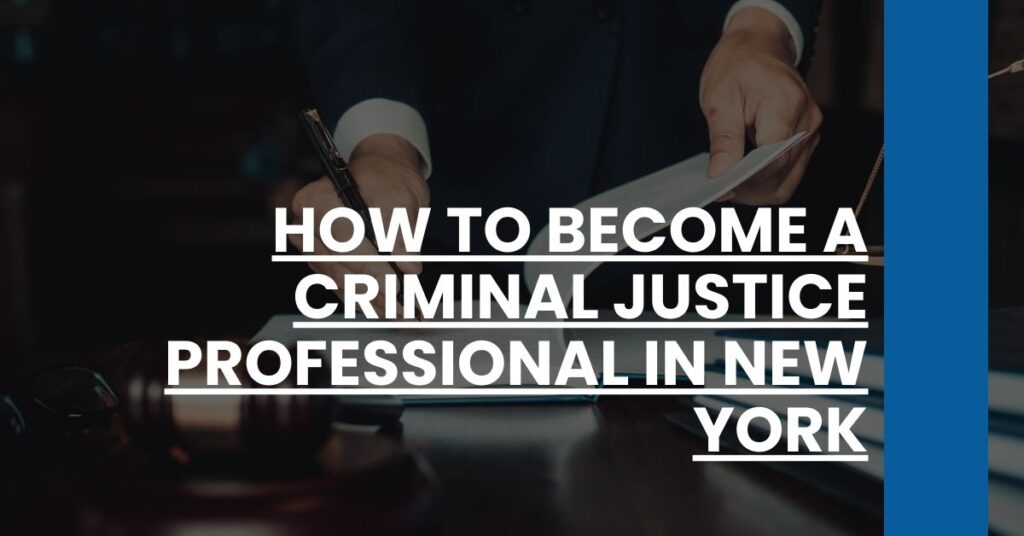Looking for schools in a specific city? Check out our lists of Criminal Justice in New York City, Hempstead, Brookhaven, Islip, Oyster Bay, Buffalo, North Hempstead, Babylon, Rochester, and Yonkers.
Becoming a criminal justice professional in New York involves a series of strategic steps.
- Understand educational requirements: Discover the degrees and programs that set the foundation.
- Gain practical experience: Learn about internships and hands-on opportunities essential for real-world applications.
- Seek certifications: Validate your skills through recognized credentials.
This guide on how to become a criminal justice professional in New York is your roadmap to success.
Looking for Criminal Justice Professional Information On States Bordering New York?
In addition to New York, we suggest looking for schools in nearby states.
- How to Become A Criminal Justice Professional in New Jersey
- How to Become A Criminal Justice Professional in Connecticut
- How to Become A Criminal Justice Professional in Massachusetts
- How to Become A Criminal Justice Professional in Pennsylvania
- How to Become A Criminal Justice Professional in Vermont
Certification
Importance of Certification
Gaining certification is a pivotal step for advancing within the criminal justice field. It validates your skills and knowledge, marking you as an accredited professional in various specializations such as criminal investigations, forensic analysis, or security management. Certifications often require rigorous study and successful examination outcomes, ensuring that you meet the highest standards in the industry.
Types of Certifications
In New York, several key certifications can enhance your credentials:
- Certified Criminal Investigator (CCI): This certification ensures you are skilled in investigative procedures and methodologies.
- Certified Fraud Examiner (CFE): This designation is highly respected for those focusing on fraud prevention and investigation.
- Emergency Medical Technician (EMT): This certification can be crucial for those involved in law enforcement or emergency response.
- Certified Crime Scene Investigator (CCSI): This certification validates expertise in crime scene processing and evidence analysis.
Benefits of Certification
Certifications offer numerous benefits:
- Career Advancement: Accredited credentials can lead to promotions and higher earning potential.
- Job Security: Being certified can make you indispensable to your employer.
- Professional Recognition: Certification distinguishes you as a dedicated and knowledgeable professional.
- Skill Enhancement: The process of obtaining certification enhances your abilities and keeps you up-to-date with industry advancements.
How to Prepare for Certification
- Research Requirements: Understand the prerequisites for the specific certification you are aiming for.
- Enroll in Training Programs: Many certifications require specialized training courses.
- Study Rigorously: Dedicate time to thoroughly prepare for exams. Study guides, online courses, and practice exams can be beneficial.
- Gain Experience: Practical experience in the field can provide invaluable insights and knowledge that exams test.
- Register and Take the Exam: Apply for the certification exam well ahead of the planned date, and ensure all requirements are met.
Continuous Learning
Certifications often require continuous education to maintain. Stay active in professional development:
- Workshops and Seminars: Topics such as advanced interrogation techniques, crisis negotiation, and the latest forensic technologies.
- Online Courses: Flexibility to learn at your own pace on emerging trends and technologies.
- Professional Organizations: Membership in groups like the American Society of Criminology can provide resources for continuous learning.
By committing to lifelong learning and actively seeking certifications, you reinforce your dedication to the criminal justice field, making you an asset to any organization within New York’s criminal justice system.
Continued education, such as programs focused on criminal behavior, forensic analysis, and behavioral psychology, deepen understanding and analytical skills, enabling professionals to excel in roles that require specialized expertise.
Workshops and seminars provide platforms for continuing education on specific topics, such as new forensic technologies, legislative changes, and advanced investigation techniques. Participation in these programs ensures that criminal justice professionals remain current with the latest trends and best practices in their field.
Continuing education not only enriches one’s qualifications but also enhances competitiveness in the job market. Employers value candidates who demonstrate a commitment to lifelong learning and professional development, as it reflects adaptability and proactive engagement with their career.
Ultimately, investing in continuous education and professional development fosters career growth, enabling criminal justice professionals to advance into specialized roles, take on leadership positions, and effectively respond to the complexities of their evolving field.

